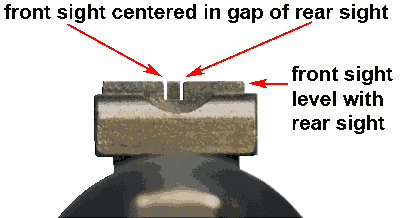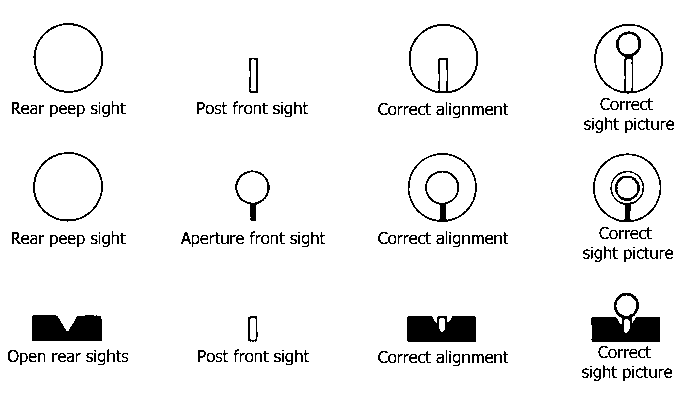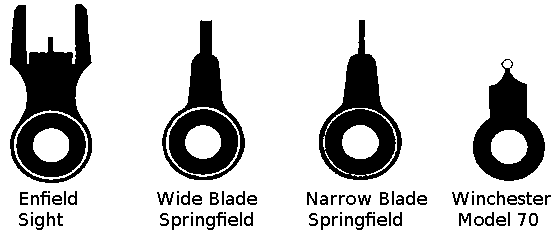Difference between revisions of "Open Sights on Rifles"
m |
m (→Aiming With Iron Sights) |
||
| Line 20: | Line 20: | ||
[[File:flatironsightposition.png]]<BR>Illustration: Align the front sight level with the top of the rear sight over your target. | [[File:flatironsightposition.png]]<BR>Illustration: Align the front sight level with the top of the rear sight over your target. | ||
| + | |||
| + | Your goal is to achieve what is known as the correct "Sight Picture." | ||
| + | |||
| + | [[File:ironsightscorrectsightpicture.png]]<BR>Illustration: Correct Sight Picture Examples | ||
== How to Sight in a Gun With Adjustable Diopter == | == How to Sight in a Gun With Adjustable Diopter == | ||
Revision as of 19:36, 29 September 2021
Terminology: Iron Sights, Open Sights, Peep Sight, Diopter, Aperture, Blade Sight, Jeager, Leaf, Folding Leaf, Tang Sight, Globe Sight, Windage Stem, Perlkorn, Ringkorn, Seilkorn,
Discussion on the types and variety of open sights
Contents
Sight Types
Common Commercial Hunting - The rear sight is known as a blade sight often on these types of firearms.

Illustration: Advantage of Open V Sight for Hunting Wild Game.
Although many iron sights on hunting rifles is completely flat, the shallow V style is becoming more popular. For hunting wild game you will find that the shallow V style rifle sight with a high contrast triangle will conceal less of the animal you are attempting to take down. The old fashioned buckhorn sight frequently found on 19th Century rifles tends to conceal two-thirds of the animal or more. Although Peep sights with shallow diopters can reveal much of the animal, target acquisition may be more difficult. Hunters tend to prefer the shallow V type sight.
Precision / Competition Shooting - Target aperture sights are designed for maximum precision. The rear sight element (often called diopter) is usually a large disk (up to 1 inch or 2.5 cm in diameter) with a small hole in the middle, and is placed close to the shooter's eye. Shooting diopters offer windage and elevation corrections. The complementing front sight element may be a simple bead or post, but is more often a globe type sight, which consists of a cylinder with a threaded cap, which allows differently shaped removable front sight elements to be used.
Unlike hunting rifles where the shooter generally has open iron sights, smallbore target rifles use what is known as "Aperture Sights". For an accurate shot with aperture sights the rear "aperture", "foresight element" and the "target diagram" must be aligned concentrically.
Aiming With Iron Sights
Iron sights used by hunters are very useful when shots are made at shorter ranges and in heavy cover. The front sight at the end of the barrel is aligned with rear sight, located to rear of the barrel or above the action.

Illustration: Align the front sight level with the top of the rear sight over your target.
Your goal is to achieve what is known as the correct "Sight Picture."

Illustration: Correct Sight Picture Examples
How to Sight in a Gun With Adjustable Diopter
You are moving the rear diopter in the direction you wish the bullet to go, which is opposite the direction to which it is off.
- If you are shooting high (elevation) lower the rear aperture.
- If you are shooting to the right, move the rear aperture left. (typically this is a counter-clockwise turn)
